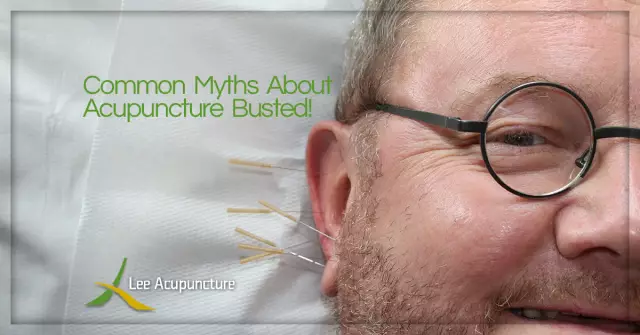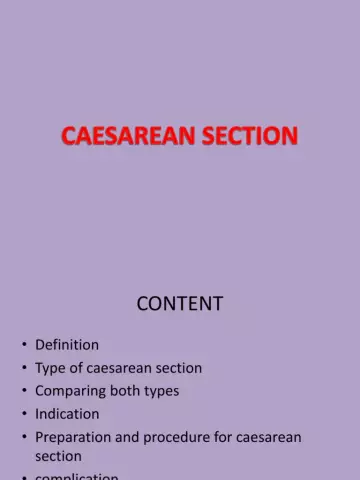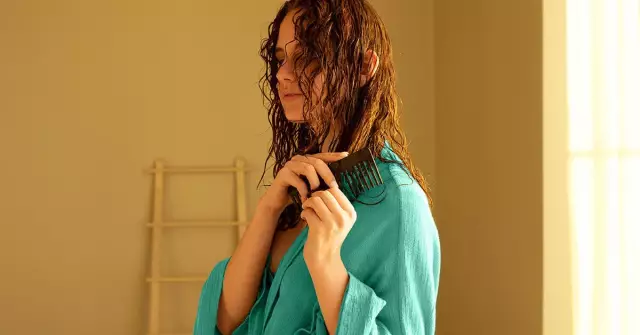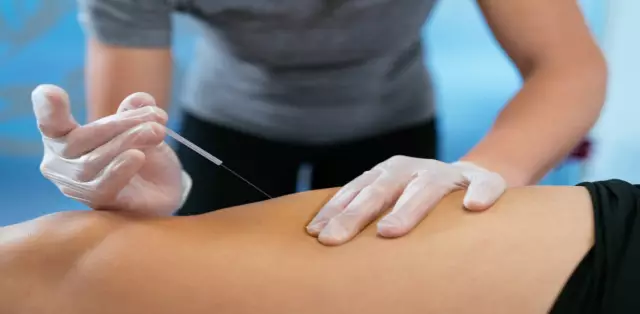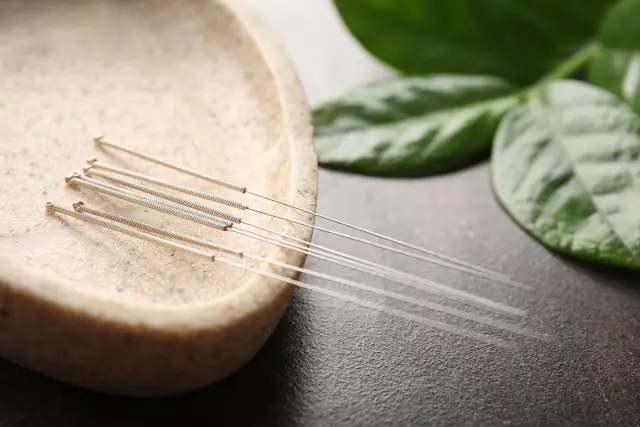- Author Rachel Wainwright wainwright@abchealthonline.com.
- Public 2023-12-15 07:39.
- Last modified 2025-11-02 20:14.
8 myths about acupuncture
Acupuncture (acupuncture) has been used for medicinal purposes for more than three and a half millennia. It is widespread and recognized by official medicine in most of the developed countries of the world. The impact of thin needles on the so-called acupuncture points helps to normalize metabolism and hormonal levels, activates the body's defenses, has anesthetic and anti-inflammatory effects, and stabilizes the state of mind.
Despite the recognized effectiveness of the method, many people have a misconception about it and are afraid to follow the recommendations of the doctors who prescribe them acupuncture courses. It is worth debunking the most persistent myths about acupuncture in order to remove unfounded fears and draw the attention of patients to a unique medical and health-improving procedure.

Source: depositphotos.com
Needle treatment is very painful
This is not true. The specialist carries out the procedure almost unnoticed by the patient. At the time of the injection, mild pain may be felt, which immediately goes away.
For an experienced reflexologist, the process of setting the needles to the desired depth is not difficult. If the patient is afraid of the procedure and is in a state of tension, the discomfort may increase. To avoid stress, you need to take acupuncture course with a doctor who has a good reputation and has earned the trust of patients.
Official medicine does not recognize acupuncture
In our country, acupuncture has been officially used for more than half a century. In the programs of many medical universities, relevant courses are included. Specialists in the field of acupuncture work in hospitals, district polyclinics and sanatoriums.
Acupuncture is incompatible with conventional therapy
Acupuncture courses perfectly complement drug treatment. There is no official information about any cases of incompatibility of the method with taking medications or treatment with other methods of physiotherapy.
Acupuncture only works for pain
The procedures really have a strong analgesic effect, but this is not all that acupuncture is capable of. Treatment courses are prescribed:
- with allergies (itching, skin rashes);
- with diseases of the digestive system (peptic ulcer, bile stasis, constipation);
- with disorders of the nervous system (neuritis, migraines, hysteria, nervous tics, enuresis);
- with lesions of the respiratory system (bronchial asthma, chronic bronchitis, tracheitis and tonsillitis);
- with inflammatory diseases of the joints (myositis, bursitis, arthritis);
- with injuries (fractures, sprains, etc.);
- with cardiovascular diseases (arrhythmias, hypotension, arterial hypertension);
- with problems with the excretory system (chronic cystitis, nephritis, prostatitis);
- with gynecological pathologies (menstrual irregularities, hormonal infertility, ovarian dysfunctions, severe cases of climacteric syndrome);
- with diseases of the organs of vision (oculomotor disorders, strabismus, etc.);
- in case of malfunctions of the endocrine glands.
In addition, acupuncture helps to get rid of excess weight and bad habits (alcohol, nicotine or drug addiction).
Acupuncture has negative consequences
In a person who has no contraindications, the procedures do not contribute to the appearance of any side effects. It should be remembered that acupuncture should not be used in the treatment of:
- children under the age of 1 year;
- cancer patients;
- patients suffering from blood pathologies;
- patients with acute mental disorders;
- patients with fever;
- people who have been diagnosed with purulent inflammatory processes or infectious diseases;
- pregnant women, if the gestation process is complicated.
With caution, acupuncture is prescribed for uncomplicated pregnancy, advanced age of the patient (over 70 years), severe exhaustion, a state of severe nervous or physical fatigue, multiple sclerosis and cerebrovascular accidents.
Acupuncture is addictive
It is widely believed that patients, once having undergone a course of acupuncture, subsequently feel bad if they cannot resort to this procedure for a long time. This is not true. Perhaps the misconception has arisen due to the fact that some chronic patients have to be treated repeatedly, since acupuncture sessions bring them temporary relief, relieving unpleasant symptoms, but not eliminating the disease itself.

Source: depositphotos.com
The result of acupuncture should be noticeable after 2-3 courses
The reaction to the procedures is individual. Depending on the state of the body and the stage of development of the disease, 2-3 to 9-10 courses of acupuncture are required.
The effect of acupuncture is purely psychological
The method has some placebo effect. However, it has been proven that acupuncture really stops inflammatory processes, stabilizes the endocrine glands and normalizes metabolism. In addition, during the procedure, a powerful release of endorphins occurs - substances that have an analgesic and tonic effect.
Acupuncture is an effective and safe method of treatment that helps to get rid of a variety of ailments. It goes well with taking medications, relieves pain and helps to stabilize the psychological state of patients.
YouTube video related to the article:

Maria Kulkes Medical journalist About the author
Education: First Moscow State Medical University named after I. M. Sechenov, specialty "General Medicine".
Found a mistake in the text? Select it and press Ctrl + Enter.

